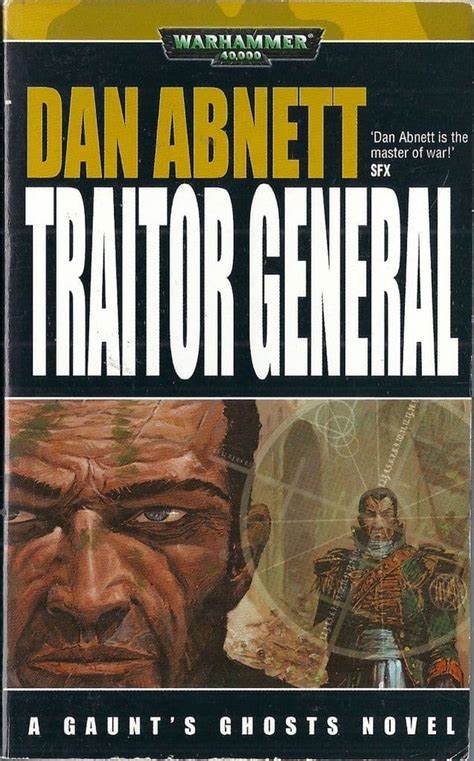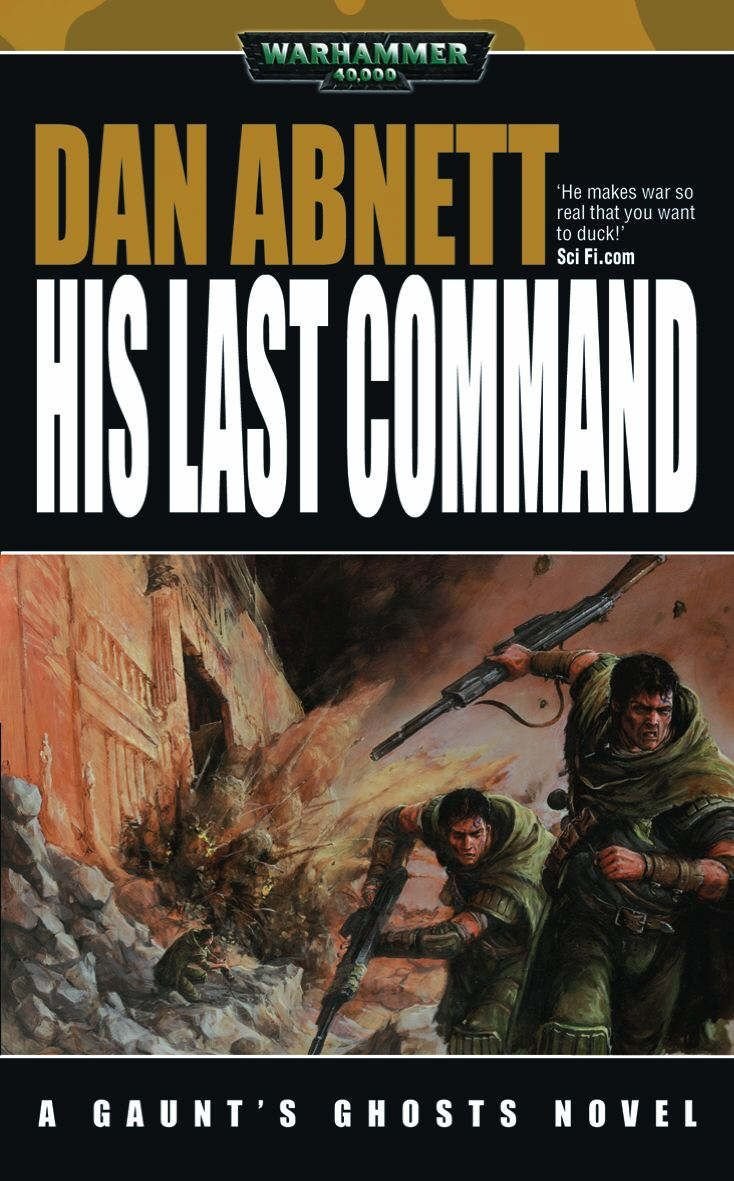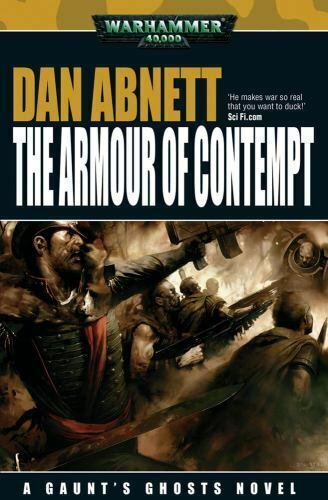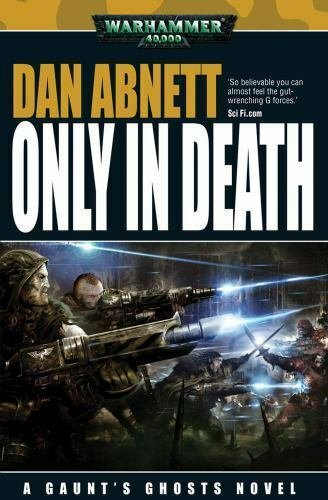Gaunt's Ghosts: The Lost review
I know I got into the habit of reading each book in the Gaunt’s Ghost series and then reviewing them almost immediately. Unfortunately, I got caught up in a bunch of other books over the past half-year. Because I’d borrowed physical copies of the Gaunt books from a friend, I ended up speeding through the final four novels so I could return the series in June.
And, as you can probably tell, there have not been four reviews since then.
That being said, I did want to at least talk about those final four books and give my overall thoughts on the series. Because, as you’ll quickly realize, I think these novels are exceptional. In fact, I’d go so far as to say that Gaunt’s Ghosts is my favorite SciFi series, and one of my favorite series overall.
Nope, that’s not hyperbolic. That is a straight and honest assessment. And here’s a few reasons why…
The beginning of the end
While there are a handful of novels in the series, I borrowed three omnibus collections: The Founding (which includes books 1-3), The Saint (books 4-7), and The Lost (books 8-11). And since I’ve already got reviews for the first seven, we’re going to focus exclusively on the novels included in The Lost.
Trying to review four books at once does mean we’ll be doing a flyby of these incredible novels. They won’t get as much attention and love as they deserve, but I’ll do my best to highlight what makes each one special. More importantly, we’ll look at how the layered plots and character development build over time, culminating in one of the most satisfying conclusions to a saga I’ve ever experienced.
…except, since I began reading the series, Dan Abnett came back to the series with additional novels. While I’m not sure what those look like, I’m already looking forward to getting my hands on them.
Anyway, let’s get to it. We’ve got 4 novels to cover and — hopefully — a reasonable amount of words to do it in. Wish me luck.
Author’s note: For what it’s worth, I’ll keep this even more spoiler free than previous reviews. Gaunt’s Ghosts is honestly so good that I’ve started recommending it to everyone, and encouraging friends to recommend it, and even having Kim recommend it to her friends. With that many people at least thinking about getting into the series, I’d like to reduce the likelihood of spoiling stuff for anyone.
“Traitor General”
As a writer, I can attest to just how difficult character growth is. Showing someone develop and change over the course of a singular novel is a common challenge for writers, but people evolve and people (as readers, viewers, players, etc.) expect the characters in any medium to evolve as well.
Tracking dozens of characters and showing clear, obvious, and emotional change over the course of years — both for Abnett as a writer as well as for the characters within the universe/setting of the novels — is a challenge I can barely even comprehend. Abnett’s ability to not only do that, but to tie back to those things and remind readers of past memories or events, is like a constant cycle that keeps the large cast refreshing and interesting time and again.
This skill comes to bear in Traitor General for one big reason: A small contingent of the Tanith First-and-only are sent on a literal suicide mission. They are dropped, behind enemy lines, on a Chaos-held planet, with a single purpose: They’ll need to make contact with the local resistance, win their trust, and convince the rebels to help them assassinate a high-value target.
The world of Gereon is in rough shape. After several years of enemy occupation, the entire planet has been corrupted…including the people. And while Gaunt has to hand-select a dozen people to send on this mission, he knows it will end in one of two ways: They will either A.) fail at their task and be killed, or B.) succeed but be corrupted by the taint of Chaos, abandoned by the Imperium, and killed anyway.
Yes, the odds are overwhelmingly against them. And while very little goes right on this mission, one thing is clear: The Ghosts are committed to the mission, even if it claims every last member of the strike force.
“His Last Command”
Gaunt shows back up in Imperial space two entire years after the Gereon mission. (And yes, that’s a spoiler, but it’s hard to avoid here, although I won’t comment on the fates of the rest of his team.)
Unfortunately, everyone believes he has been tainted by Chaos, exposed to its corruption and possibly even psychically altered by the Ruinous Powers. He is captured, interrogated, even tortured to some degree. But the worst part of it all is discovering that the Imperium gave up on him and merged the Tanith First-and-only with another Guard regiment.
Gaunt is put back in the rank and file of the Guard, but he will no longer lead the Ghosts. In fact, he isn’t even allowed to see or interact with them. Instead, he is put under the watchful eye of other commissars who claim to be friends but are ready to execute him at the slightest hint of Chaos taint.
Every page of His Last Command is edged with tension. Seeing the Tanith interact with other officers is odd, albeit refreshing to reconnect with characters who weren’t on the Gereon mission. But watching Gaunt attempt to navigate what is basically a looming witch-hunt while settling back into the army and navigating one of the most difficult battlefields of his career stacks one layer of stress onto another.
In fact, those layers build and build until a moment that is both catastrophe and (to use a term coined by Tolkien) eucatastrophe — a sudden and unexpected turn of events for the good of those involved. The novel is a challenge to wade through, and yet a pivotal piece building towards something truly extraordinary.
“The Armour of Contempt”
It seemed inevitable that Gaunt and his select group would eventually make their way back to Gereon. They had left friends behind with the resistance force there, and Gaunt had sworn he would come back for them. But when rumors arise that the secret immunity to the taint of Chaos might exist on the corrupted planet, the Imperium leadership — and the mysterious Inquisitors — send the Ghosts back.
But this isn’t just a “liberation” assault: The Inquisitors believe that they must retake Gereon at any cost, no matter what it means to the resistance, the long-abused residents, or the Imperial soldiers they send.
The Armour of Contempt led back to the theme in some of Abnett’s earlier books, forcing me (as a reader) to come to terms with how brutal Imperial leadership can be. The men of Tanith fight brutal battles of their own, but one of the best perspectives in the entire omnibus of novels sees a young recruit — the son of a Ghost, in fact — experience the horrors of war for the first time.
It’s…messy. Horrific, even. The carnage and gore he witnesses, and the brutality of Chaos, and the casual disregard of soldiers by Imperial officers… The whole thing is gruesome. I admit that I’d explore an idea like this in my SciFi series (particularly in The Cost of Command), but it was nothing like what Abnett explores here. Close-quarters combat in a cityscape is truly madness, and Abnett’s depiction of it affected me and changed my understanding of how ugly war can be.
Yes, the overall story development is good; I’m happy to have gotten a resolution to the Gereon story arc, and to know that the rest of the Ghosts can relate to the difficult experience that Gaunt and his strike team endured in their two years behind enemy lines. But seeing the world through young Dalin’s eyes — a teenager who never even completed basic training — becomes the heart and soul of the novel.
“Only in Death”
Okay, so it’s been really difficult keeping these synopses brief and spoiler free. That’s especially true of Only in Death, long thought to be the conclusion of Gaunt’s Ghosts as a series.
Gaunt and his men are sent to Hinzerhaus, a citadel high in the mountains of a duststorm-ridden world called Jago. Their mission is to hold the castle to make sure the forces of Chaos don’t find it. But the Tanith First-and-Only soon discover that there’s much more about the keep than the expected. Lights that flicker. Halls that echo with strange voices. Hidden passages that open and vanish without reason.
And then the forces of Chaos appear, attacking like ghosts in the citadel — ironic, given that the Ghosts of Tanith find themselves trapped indoors and unable to use the stealth and recon skills they’re known for.
Is Hinzerhaus haunted? Are the men going mad? Is Chaos working some dark, psychic magic on them? Is it some combination of the three? And when contact with the outside world is lost and help is no longer coming to reinforce them, how do the soldiers accept their impending and inevitable deaths?
It is downright miraculous how everything comes together in the end, and not just in the sense of it being a singular novel. That Abnett managed to tie character arcs from all 11 Gaunt’s Ghosts novels absolutely astounded me; it’s the first time in a decade that I stayed up until 2 or even 3 a.m. multiple nights in a row, unable to put down a book.
And I’m not just talking about living characters. Abnett looped back in fallen heroes as far back as the first set of three, reminding readers of those soldiers and reintegrating their memories into the lives of the men of Tanith. (Yes, using a “haunted keep” and strange visions gave a lot of opportunities for this.)
In a nutshell
I said this at the start, but there is not a single reader I wouldn’t recommend Gaunt’s Ghosts to. (Although obviously I wouldn’t suggest jumping into The Lost and skipping the first seven novels.) I’ve talked about the series and piqued the interest of casual readers, SciFi aficionados, Roman history buffs, alternative history novel readers… Heck, name an area you’re interested in and I bet I’ll find a way to get you curious about Gaunt’s Ghosts too.
Pros
+ Full circle ending (for all 11 novels up to this point)
+ Character development over time (which is hard)
+ Deep, unfiltered look at the horrors of war
+ Gradual but effective buildup of tension
Cons
- Some story ideas are “too big” for a single novel





